Indice - Table of contents
Lo Nuevo[hide]
Reportes: From The St... : Cubadisco 2...
Tienda: Cuban Music Store
Reportes: From The St... : Cubadisco 2...
Fotos: Tom Ehrlich
Staff: Kristina Lim
Musicos: Juan Formell
Musicos: Yordamis Megret Planes
Musicos: Yasser Morejón Pino
Musicos: José Luis "Changuito" Quintana...
Musicos: Dennis Nicles Cobas
Fotos: Eli Silva
Grupos: Ritmo Oriental : 1988 - Vol. IX - 30 a...
Musicos: Rafael Paseiro Monzón
Musicos: Jiovanni Cofiño Sánchez
Fotos Del Día [hide]
Discography - The 3rd Phase: 86-91
1986 - Tercera Etapa - Sonográfica
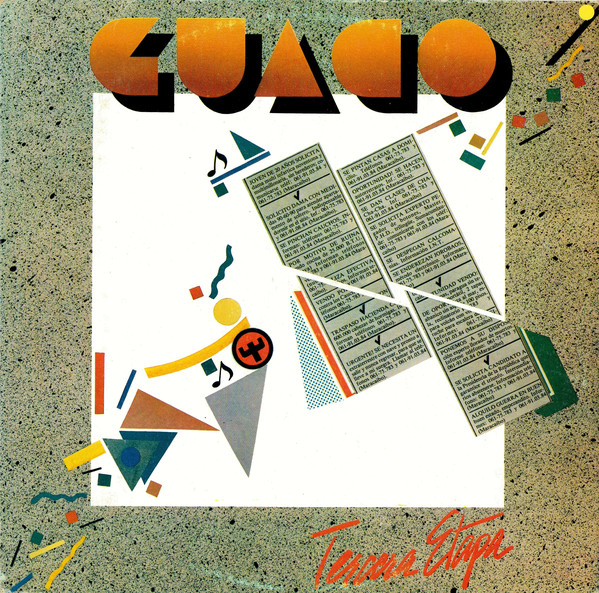
Side A
01- Margarita Vice (Vais) (Heriberto Molina/F. Valladares/A. Pérez)
02- Aguas de Cristal (José Luis Suárez)
03- Nuestra Locura (Heriberto Molina/Romer Quintero/Alirio Pérez)
04- Juntos En Lo Mejor (Daniel Somaró)
05- Virgen Guaquera (Heriberto Molina/Sundin Galué)
Side B
01- Anuncios Clasificados (Heriberto Molina/Fernando Valladares)
02- Así Es Mi Amor (Sundin Galué/Alirio Pérez)
03- Confesión (Heriberto Molina/Romer Quintero)
04- La Radio (Heriberto Molina/Juan C. Salas/Argenis Peña)
05- Algo Controversial (El Vivir Es Así) (Heriberto Molina/Romer Quintero)
Personnel
Vocals: Gustavo Aguado (tracks A1, A2, A5), Daniel Somaró (tracks A3, A4, B4), Sundín Galué (tracks B1, B2), Romer Quintero (tracks B3, B5)
Tambora: Johnny Flores & Luís Rincón
Charrasca: Alexis Moreno
Congas: Rolando Hernández
Drums: Argenis Peña
Percussion: Alfonso Aguado
Keyboards & Percussion: Fernando Valladares
Flute & Sax: Frank Velásquez
Trumpet: Juan Carlos Salas & Manuel Romero
Trombone: Norman Cepeda
Bass: Sundín Galué
Guitar: Romer Quintero
Piano: Alirio Pérez
Guest Musicians:
Backing Vocals: Colina, Franco De Vita, Ilan Chester, Francisco Pacheco, Yordano, Evio Di Marzo & Alberto Slezynger
Production Credits
Produced by Gustavo Aguado
Graphic Design: Grafi/Record
Graphic Concept: Fernando Valladares & Gustavo Farías
With the departure of Ricardo Hernández , the group had to quickly establish a different personality without him. Thus, the symphonic style of orchestration, the long instrumental passages and the arranging flights of fancy -which Ricardo made sound easy- were compressed, the gaita songs were left to a minumum and overall the band got tighter. This will be the last Guaco album to be recorded live in the studio and without a click. Overall, this incarnation of the band has more in common with the last 3 albums than what came after, and judging by the credits on the back cover, it was a much more collaborative affair. Drummer Argenis Peña came in after Federico Pineda decided to relocate permanently to the US, and the string section was given the boot, but overall the line-up stayed the same.
Aguas de Cristal is Gustavo Aguado's favorite Guaco song. Margarita Vice is the unofficial sequel to Adiós Miami, featuring Guaco's first use of a drum shuffle. Nuestra Locura features an early use of a hook tumbao -with plenty of bloques to spare-. Virgen Guaquera is the gaita that Guaco still plays most to this day. La Radio has been the second-to-last song in ther show-ending medley since the late 80s. Overall, a bit of an underrated effort, really. Asuntos Clasificados manages to cram about 5 hooks in 1 minute, the merengue Algo Controversial is not to be missed as well.
1987 - Maduro - Sonográfica
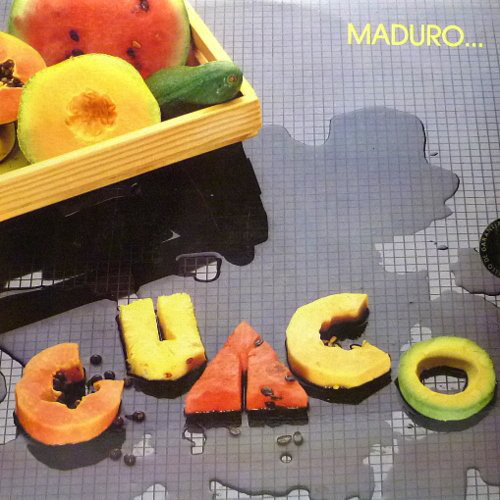
Side A
01- Zapatero (Abdenago Borjas)
02- Discúlpame Pero Perdóname (Abdenago Borjas)
03- Pregúntale A Carruyo (Abdenago Borjas)
04- La Duda (Fernando Valladares)
05- La Primera Vez (Abdenago Borjas)
Side B
01- Welcome To Callao (Abdenago Borjas)
02- Hoy Te Quiero Cantar (Alirio Pérez)
03- Serenata (Heriberto Molina/Alirio Pérez/Abdenago Borjas)
04- Con La Soga En Los Pies (José Luis Suárez)
05- Una Noche Cualquiera (Daniel Somaró)
Personnel
Vocals: Nelson Arrieta (tracks A1, A5), Sundín Galué (track A2), Gustavo Aguado (tracks A3, B1, B3), Daniel Somaró (tracks A4, B2, B5), Carlos Puchi (track B4)
Tambora: Johnny Flores & Luís Rincón
Charrasca: Alexis Moreno
Drums, Congas & Percussion: Argenis Peña
Percussion: Alfonso Aguado
Congas & Percussion: José Lorenzo Jansen “Pachin”
Timbales, Keyboards & Percussion: Fernando Valladares
Flute & Sax: Frank Velásquez
Trumpet: Juan Carlos Salas & Manuel Romero
Trombone: Norman Cepeda
Bass: Carlos Puchi
Guitar: Carlos Añez
Cuatro: Sundín Galué
Piano & Keyboards: Alirio Pérez
Backing Vocals: Sundín Galué, Carlos Puchi & Fernando Valladares
Guest Musicians:
Bass: Lorenzo Barriendos
Guitar: Eddy Pérez
Programming: Willie Croes
Congas & Percussion: Orlando Poleo
Sax: Ezequiel Serrano
Timbales Solo: Alberto Borregales (track B1)
Roland TR-707 Programming: Jesús González
Backing Vocals: Froila Gil, Liliam Frías & Magaly Pacheco
Production Credits
Produced by Willie Croes
General Direction: Alfonso Aguado
Musical Director: Alirio Pérez
Recorded & Mixed by Juan Carlos Socorro & Miguel Angel Larralde at Telearte (Caracas)
Recording Assistant: Manuel Guillermo
Graphic Design: Grafi/Record
Photo: Ramón Bassols
Tercera Etapa performed well, but it was the work of a band in transition. The band needed to have a smash hit, so Gustavo called up Gran Coquivacoa's head honcho Abdénago "Neguito" Borjas, one of the great songwriters born in the Zulia state, to provide half an album worth of songs. He also called up Willie Croes to produce the album. Willie at the time was Yordano's keyboard player and musical director. The goal was obvious: to modernize Guaco's sound and bring it closer to the 80s pop production standards. Willie took charge and the band was run through a sequencer, hardly anybody played instruments on the thing. I have a big suspicion most of the instrumentation was done by the session musicians listed on the back cover.
The big arrival was on the vocal front: Nelson Arrieta, a supple sonero who came from Carángano, sang Zapatero -a song which also had an accomapning choreography, which was part of Guaco's bid for national mainstream attention-. Also on the rejuvenating front: a merengue. Discúlpame Pero Perdóname had quite a bit of traction, powered by Sundín Galué's mature and souful timbre. Some of the material is quite strong as well: Hoy Te Quiero Cantar is airy and mysterious, La Duda doubles down on the eerie ambiance. The less we talk about the band's calypso excursion Welcome To Callao, the better. It ends on a strong merengue: Una Noche Cualquiera.
For live performances of the material big changes came: Sundín Galué stepped down as a bassist, Carlos Puchi entered for him, he remained a singer however and he was widely considered Guaco's best dancer. Valladares added a strange keyboard/timbales set-up: A couple of Yamaha DX7 plus a timbal and a timbalito on the side. Argenis Peña was given a set of Roland Electronic Drums to modernize the sound. Legendary Romer Quintero left to play bass for Cardenales del Éxito, who were going on a run of gaita dominance never before seen, one that would last well into the 90s.
This is also around the time where Chick Corea's Elektric Band started being super influential for gaiteros around Maracaibo (especially those fresh out of music school!). Chick Corea's (and jazz fusion in general) influence is not to be diminished, harmony got a lot more non-functional, the timbres were virtually the same, also the song-ending bloques also are reminiscent of Frank Zappa. The band has been on record they lifted quite a few things from guitar legend Allan Holdsworth, as well.
1988 - Dejando Huella - Sonográfica
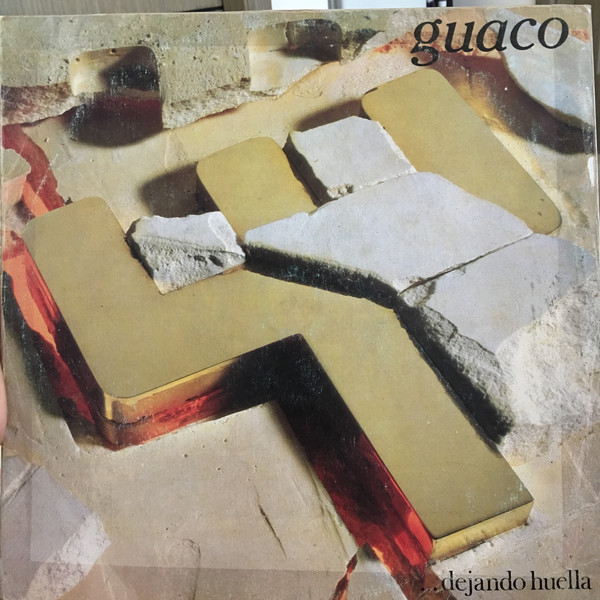
Side A
01- El Reportero (Abdenago “Neguito” Borjas
02- Cuatro Estaciones (Abdenago “Neguito” Borjas)
03- Bubu Guaco (D. en D.)
04- Ayer (Abdenago “Neguito” Borjas)
05- Siempre Te Cantamos Chinita (Abdenago “Neguito” Borjas)
Side B
01- Guayana Watch Out (Abdenago “Neguito” Borjas)
02- Dile (Trini Rondón)
03- Pa' Fuera (Fernando Valladares)
04- Esta Noche (Félix Luzón/Carlos Puchi)
05- Suicidio (Rafael Greco)
Personnel
Vocals: Nelson Arrieta (tracks A1, B2, B3), Sundín Galué (tracks A2, A4), Gustavo Aguado (tracks A3, A5, B1), Carlos Puchi (track B4), Rafael Greco (track B5)
Tambora: Johnny Flores & Luís Rincón
Charrasca & Guayo: Alexis Moreno
Drums & Percussion: Argenis Peña
Percussion: Alfonso Aguado
Congas & Percussion: José Lorenzo Jansen “Pachin”
Keyboards & Percussion: Fernando Valladares
Flute & Sax: Frank Velásquez
Trumpet, Flugelhorn & Programming: Juan Carlos Salas
Trumpet: Manuel Romero
Trombone: Norman Cepeda
Piano, Keyboards & Programming: Alirio Pérez
Backing Vocals: Gustavo Aguado , Nelson Arrieta , Sundín Galué, Carlos Puchi, Rafael Greco & Fernando Valladares
Production Credits
Produced by Willie Croes
General Direction: Alfonso Aguado
Musical Director: Alirio Pérez
Recorded & Mixed by Juan Carlos Socorro at Telearte (Caracas)
Recording Assistant: Manuel Guillermo & Paúl Fernando
Art & Graphic Design: Creatidea
Another Willie Croes production. This album might as well be called "Son of Maduro". Reportero was the last of Guaco's man-on-the-street kind of songs, this one was an homage to journalism and it was recieved by the press with a shrug, naturally. We get the definitive remake of Bubu Guaco, finally. Cuatro Estaciones is another Neguito-penned-Sundin-sung merengue, and it remains on the setlist to this day. However, musicians in the band don't like the song at all and these days is played with a plena rhythm in an attempt to make it more fun for the guys in the band. Dile is a straight up mechanical-songo, up there with the likes of El Buenagente and Se Acabó El Querer. Pa Fuera features the band trying their hand at vallenato. Suicidio is a new wave rock track, written by newcomer saxophone player Rafael Greco. Also worthy of noting is the unlikely reunion with Ricardo Hernández, who plays guiro on the cha-cha-chá Esta Noche. Relations remainced icy afterwards nevertheless.
1989 - Betania - Sonográfica
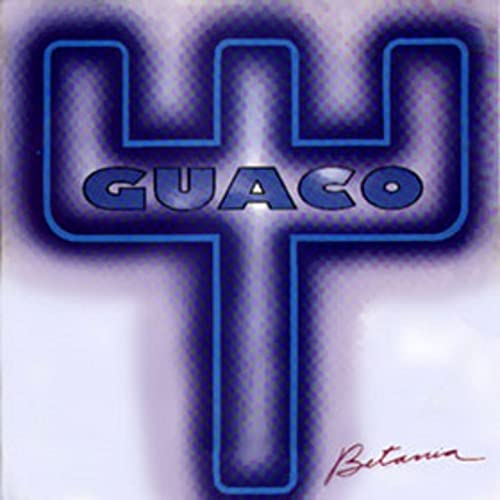
Side A
01- Rumba De Amor (Carlos Pucci)
02- Atracción Fatal (Rafael Greco)
03- Que Nadie Se Mueva (Ricardo Hernández)
04- Tamborera Cuatro Mambos (Neguito Borjas)
Side B
01- Sara (Carlos Nieto)
02- Te Tengo Que Olvidar (Neguito Borjas)
03- Nos Dejaron (Ricardo Portillo/Simón García)
04- La Placita (Nelson Romero)
Personnel
Vocals: Gustavo Aguado (tracks A3, B3, B4), Nelson Arrieta (tracks A2, A4, B1), Carlos Pucci (track A1), Rafael Greco (track A2), Sundín Galué (track B2)
Keyboards: Agustin Espina, Fernando Valladares & Rafael Greco
Tenor & Soprano Sax: Rafael Greco
Alto Sax, Clarinet & Keyboards: Marcos Salas
Trumpet, Flugelhorn Keyboards & Programming: Juan Carlos Salas
Trumpet: Manuel Romero
Trombone: Norman Cepeda
Tambora: Johny Flores & Luis Rincón
Percussion: Alfonso Aguado
Charrasca & Guayo: Alexis Moreno
Congas: Anibal Peraza
Drums: Fernando Valladares
Background Vocals: Gustavo Aguado, Sundín Galué, Rafael Greco, Carlos Pucci & Marcos Salas
Guest Musicians:
Timbales, Congas & Percussion: Luis Quintero
Guira: Angel Pirela
Background Vocals: Eduardo Stambury & Juan Carlos Arcaya
Vocals: Yordano, Cecilia Todd, Sergio Pérez, Elisa Rego, Juan Carlos y Fernando & Luz Marina (track B4)
Vocal Intro: Tony Escobar (track A3)
Production Credits
Produced by Gustavo Aguado & Juan Carlos Salas
Musical Direction: Carlos Pucci
Recorded & Mixed by Hermes Carreño, Juan Carlos Socorro & Rafael Henriquez
Assistant Engineers: Carlos Montezuma & Manuel Guillermo
Recorded & Mixed at Estudios Telearte (Caracas)
Graphic Design: Valerio Do Carmo
Illustration: Eduardo Capuano
Photo: Diego Calderón
This is a step-up from the last two, at least songwriting wise. It has more-or-less the same production values of Maduro and Dejando Huella. Session legend Luisito Quintero was brought over to play percussion, probably all of it for this album. (I've read he joined the band briefly, but haven't been able to confirm). Rumba De Amor is a personal favorite, but I've never seen anobody sing its praises. Atracción Fatal is a son-montuno writter by Greco, sung by Arrieta and rumor abounds it was about Sundin Galue and his girlfriend. It repeats the clave when transitioning to the coro, and also in the mambo, so make sure you pay attention to it!
Que Nadie Se Mueva is a remake from Guaco 75 with exttremely dated intejections by DJ Tony Escobar. Tamborera Cuatro Mambos is exactly what it says on the tin and got plenty of stage-time as a quick burn-down-the-house set-closer. Sara is a very funny (and pro-women!) song about the mistreatment women endure in the workplace. It's not exactly PC but its intentions are good. Te Tengo Que Olvidar finishes the Sundin merengue trilogy. It went nowhere but its nice enough. Then the album drops off with the unwelcome return of a Ricardo Portillo song.
This album got reissued a year later as Atracción Fatal '90, with an added cover of Roberto Roena's Mi Desengaño, the arrangement took some cues from a Lyle Mays album.
Line up wise: Agustín Espina substitues the departing Alirio Perez, who in the late 90s joined Jaraná. He died around 2000, sadly. Agustín was trained in the jazz field by Gerry Weil. A Polish pianist who ended up in Venezuela in the 60s and taught advanced harmony for entire generations of venezuelans, including various Guaco members. Marcos Campos Salas (might be related to Juan Carlos?) replaced Frank Velázquez. Valladares went back to the drum set after Argenis Peña left for Miami, where he became a respected session musician, including becoming one of Emilio Estefan's go-to men and playing with Shakira.
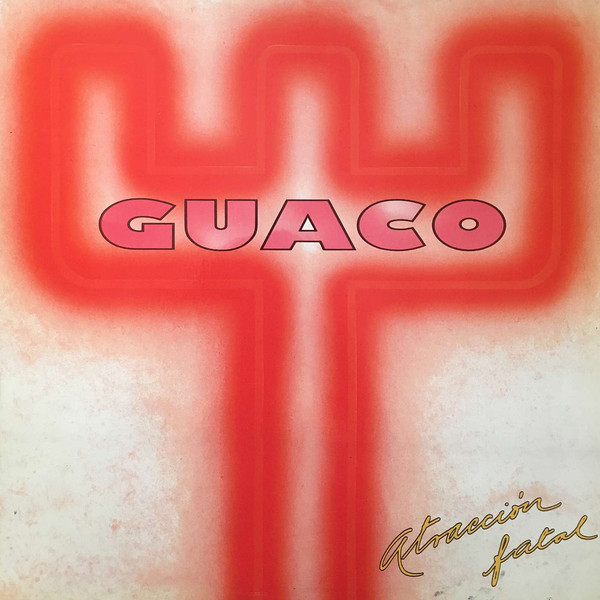
1990 - Guaco 90 - Sonorodven
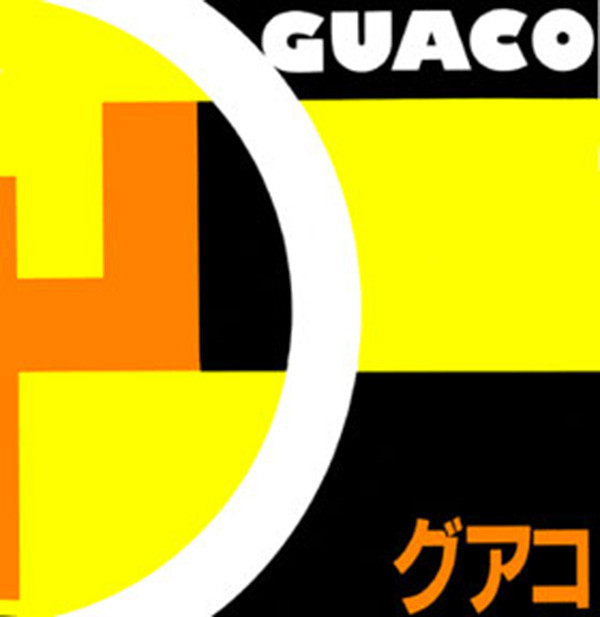
Side A
01- Me Vas Llevando (Ignacio "Nacho" Rondón)
02- Nunca Te Olvidaré (Edgar Salazar/Manuel Urbina)
03- Mi Tamborera (Ricardo Hernández)
04- Mía Toda (José Luís Suárez)
Side B
01- Fábula (Henry Martínez)
02- Amor De Camino (Jorge Luis Chacín)
03- Y No Estar Solo (Arturo Pareja Obregón)
04- San Juan De Dios (Nelson Romero)
Personnel
Vocals: Gustavo Aguado (tracks A1, A2, B4), Nelson Arrieta (tracks A3, B1, B3), Sundín Galué (track A4), Carlos Puchi (track B2)
Tambora: Johnny Flores & Luís Rincón
Charrasca: Alexis Moreno
Drums & Backing Vocals: Fernando Valladares
Percussion: Alfonso Aguado
Congas & Bongos: Nestor Pérez
Timbales: Julio Rivera
Tenor Sax: Rafael Greco
Alto Sax & Keyboards: Marcos Campos Salas
Trumpet: Juan Carlos Salas, Junior Romero
Trombone: Norman Cepeda
Piano & Keyboards: Agustín Espina
Bass: Carlos Puchi
Guest Musicians:
Vocals: Karina (tracks A2)
Backing Vocals: Edgar Salazar, Pedro Castillo
Timbales, Bongos & Congas: Luis Quintero
Production Credits
Produced, Arranged & Directed by Juan Carlos Salas
General Direction: Alfonso Aguado
Recorded & Mixed by Hermes Carreño & Ramón Valeri at Audio Uno (Caracas)
Graphic Design: Fernando Batoni
Uneven and tentative. Yet it contains one of Guaco's most undeniable songs: Me Vas Llevando, which still gets plenty of live airings. Nunca Te Olvidaré is a warm duet with teenybopper Karina, and it also became a big hit. Mi Tamborera is yet another remake, this time dating from 1973. Please note that all remakes in the last few albums were songs originally sung by Argenis Carruyo. However, Nelson Arrieta does a great job making the song his own.
Side B is a bit of a waste. Fábula is a minor morality tale, which seems forced in retrospective. Y No Estar Solo is great: a longing and ruminative track about the dangers of solitude, masterfully sung by Arrieta.
By now, even though the albums were obscuring what Guaco was capable of, especially live. We must also take in considerating the pressures put in place by the marketplace. Guaco needed to sound fresh and modern, even if the production has dated badly to modern ears, it's still exciting hearing the band try to figure out how to meld man, machine and their perculiar tamborera fusion. There's a certain primitiveness to the sound and that makes this era frustrating but also rewarding, at least when the songwriting was up-to-par. If you must, catch a live version of Me Vas Llevando from around this era and hear how Guaco was completely transforming this material for the stage.
Lineup wise, we are becoming more and more closet to the "Dream-team" line-up from the 90s.(It must be noted that the Ricardo Hernandez years had a dream team of its own as well!). Timbalero Julio Rivera joined from Carángano, even though I'm not entirely sure he was featured on this album.(Pretty sure Luisito Quintero plays all percussion but tambora and charrasca here as well). He might've arrieved as early as 1988, but this is the first album to credit him. On Tumbadoras, the great Nestor Pérez joined, coming over from Jaraná. A man with an unbelievable masacote and a super solid marcha. He also liked to play with 3 congas, the first Guaco tumbador to do so. Both became stalwarts of the rhythm section for the rest of the 90s.
1991 - Guaco 91 - Sonorodven
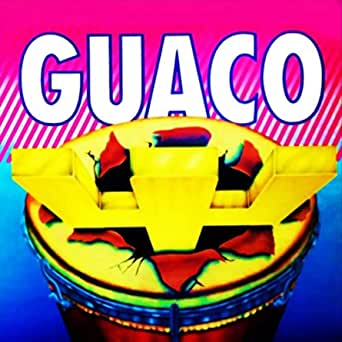
Side A
01- Ya No Eres Tu (Jesus Risso/Jorge Luis Chacin)
02- Suena (José Alfonso Quiñones)
03- La Casita (Nelson Romero)
04- Las Escaleras (Jorge Spiteri)
05- La Sirenita (Nelson Romero)
Side B
01- Invitame A Tu Casa (Fernando Touzent)
02- Oyela (Rafael Greco)
03- Regalame Tu Amor (Omar Hernández)
04- No Me Mereces (Nomar Guevara)
05- Tengo Que Decir Adios (Pedro Castillo)
Personnel
Drums – Fernando Valladares
Featuring – Gilberto Santa Rosa (tracks: 1), Proyecto M (tracks: 6)
Lead Vocals – Gustavo Aguado (tracks: 1, 3, 5, 6, 7, 9), Nelson Arrieta (tracks: 2, 6, 8, 10), Sundín Galué (tracks: 4, 6)
Percussion – Alfonso "Pompo" Aguado, Julio Rivera
Charrasca – Alexis Moreno
Tambora – Luis Rincón, Yonis Flores
Tenor Saxophone – Rafael Greco
Trombone – Norman Cepeda
Trumpet – Manuel Junior Romero
Trumpet, Programming, Music Director – Juan Carlos Salas
Arranged By – Juan Carlos Salas (tracks: 1, 2, 4, 5, 8, 9), Rafael Greco (tracks: 3, 10)
Arranged By [Brass], Soprano Saxophone – Ezequiel Serrano (pistas: 10)
Production Credits
Producer – Gustavo Aguado, Juan Carlos Salas
Recorded By, Mixed By – Hermes Carreño
The final album before Guaco would overhaul their sound yet again. It's a bit better than the last one but most of the harmony remained sequenced. The conga playing (and mix!) is pretty great though, especially on Suena, which pays homage to salseros around the world. Ya No Eres Tu was the first of many collaborations that Gilberto Santa Rosa did with the Guaco guys and it's a great songo track. La Casita is a proggy little number, of which Sundín Galué was a great fan. The album also features Regálame Tu Amor, written by Afrocuba's bassist Omar Hernández., and it went on to be one of Guaco's greatest arrangements. It closes strong with No Me Mereces,a Jarana cover and Tengo Que Decir Adios, written by Venezuelan prog-pop master Pedro Castillo.
The line-up seems incomplete as it's missing mention of Nestor Pérez, whom presumably played congas (yet in Suena, Argenis Peña -who had departed in 88 to Miami!- is mentioned). The bass is programmed, which is why it was probably not listed.

















